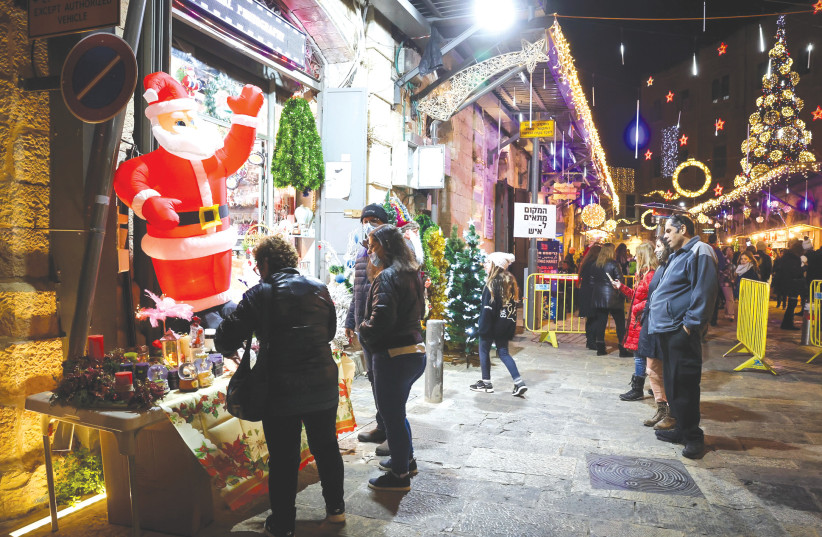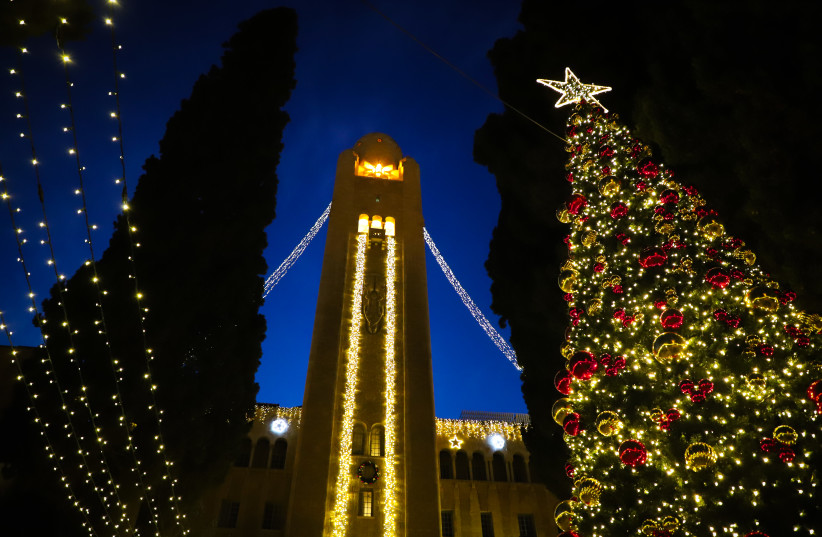 Enjoying Christmas as a Jew – no place like ‘Home for the Holidays’ – opinion
Enjoying Christmas as a Jew – no place like ‘Home for the Holidays’ – opinion
DANIEL S. MARIASCHIN
Looking back, I recall what it was that we as children really enjoyed: the snow, the ice skating, the hot chocolate and “the time of the season.”.

Once the local radio stations begin playing Perry Como’s “Home for the Holidays”, just before Thanksgiving, nostalgia for my New England childhood goes into high gear.
Como’s hit song, which continues to be played right through the Christmas season, is in a category which is properly secular, and could easily be enjoyed by Jewish families without the uneasiness about other holiday music that tends to the religious side of the spectrum. But more on the music later.
We lived in a real Currier and Ives setting, in southwestern New Hampshire. Snow would often come early, in November, and the pond in front of our house would usually freeze over, and be safe enough to ice skate on, by mid-December.
There were only 25 Jewish families living within a 25-mile radius of where we lived, and only four in my hometown, Swanzey. My parents owned a small women’s clothing store on Keene’s Central Square. My father was in charge of decorating the display windows. A very artistic fellow, he painted, on specially-sized paper, a floor to ceiling winter backdrop mural that imagined looking out a window onto a winter scene, complete with icicles and snow drifts.
Some years, we would take a slight detour when driving home from the store to drive around Keene’s Edgewood neighborhood to look at the Christmas lights and decorations that we thought were the city’s best.

Christmas can be a difficult time for Jewish children raised in an environment where almost everyone else, including my schoolmates, was not Jewish. That said, I was pretty well-grounded by my parents in our traditions, and the build-up to Hanukkah was a time I enjoyed, as well. For us, it was much less about the gift giving than it was about the story of the Maccabees, the excitement of lighting the menorah, my mother’s truly outstanding latkes, and for me, receiving those gold-wrapped chocolate coins in those little mesh bags.
When it came to school, though, it was a different story. In the younger grades, especially, the weeks leading up to Christmas were dominated by talk amongst my schoolmates of long lists of Christmas presents that had been requested, and the uneasiness of wondering whether or not their wishes, and their entreaties to Santa (or their parents), would be granted.
I understood that this kind of gift-giving did not apply to me, but I admit to speculating about what I might ask for, if I could. We always had a big Sears, Roebuck holiday catalog in the house that had a large section on toys. I always had my eye on a toy gas station, complete with pumps and service bays, and especially, a Tonka Toys road construction set, which came with a dump truck, bulldozer and a tiny “Men at Work” sign.
Alas, my parents’ idea of gifts for Hanukkah were more in the vein of books and clothing.
When I was a third-grader, I was the only Jewish student, and only one of three Jews, in the entire school. So when my teacher, Mrs. Phippard, approached me to come to class the next day and tell the story of Hannukah – to use the Yiddish word – I nearly “plotzed.” At that age, and with that holiday, I didn’t want to appear different. But well-prepped by my parents, I summoned up the courage, and told the story (a fight for religious freedom is a tough concept for eight-year-olds) as best I could.
About 10 days before we broke for Christmas vacation, we would draw names in class for gift-giving. Each student would give a gift, and receive one, which was an equitable way to make sure no one went away empty-handed. In the seventh grade, I received something extra: My teacher, Mr. Main, knowing I was by then a sports fanatic, gave me a college basketball media guide for the 1961-1962 season. It was one of the best gifts I have ever received, for any occasion.
IN GRADE SCHOOL, I sang in a boys choir. Our music teacher, Mrs. Howard, was a perfectionist, and drew the best out of those untrained voices. There was always a well-attended annual Christmas concert, and the program included the usual carols and seasonal songs. It usually concluded with, O Holy Night, with its sweeping, powerful build-up, so well-suited for a choral presentation. Mindful of exactly what I was singing about, I was always careful to lip-sync or simply avoid some of the Christological references in the song’s lyrics.
For sure, no one noticed.
In my senior year in high school, my social studies class hosted a group of Head Start kids for a Christmas party. I was asked if I’d be Santa Claus and gladly agreed. Though, they found a costume for me, which fit fine, it was the scratchy fake beard that I recall being unusually irritating.
Someone took a photo, which wound up in our yearbook, with the caption: “It was the night before Hanukkah.”
Some years later, when I worked as a disc jockey at one of our local radio stations, Christmas music – unlike today – began being played after Thanksgiving, and even then, on an escalating schedule leading up to Christmas Day. In the winter, I worked weekends and holidays, and on December 25th, I probably was on the air for 8 hours or so.
There were no commercial announcements on Christmas Day, but local businesses could sponsor, PBS-style, albums of holiday music. So I would introduce a segment with something like: “And now, more music of the season, with “Merry Christmas” with Andy Williams brought to you with warm holiday wishes by the Cheshire Tire Company.”
Since, at the time, I was usually studying for final exams at the University of New Hampshire, I would often bring my course notebooks with me to the radio station and use the time to study, with the holiday music in the background. An early exercise in multi-tasking!
The holiday season was pervasive; it was everywhere: in the music, the decorations, the chimes in the church belfry at the head of Central Square – about a block away from our store – pealing carols every evening, and especially, in the weather. Indeed, meteorology was very much a part of the moment. The cold, brisk air, snowflakes occasionally drifting down, and sometimes snowstorms – only added to the winter-like setting that most folks, even in warmer climes, associate with the holidays.
Growing up, most folks didn’t realize Jews celebrated a holiday this time of year; they just knew that we didn’t celebrate Christmas. Today, because of greetings to us on TV (we’ve all heard the anchor at the end of the newscast say “… and to our Jewish friends, a Happy Hanukkah!”) and through the internet, many more non-Jews know about Hanukkah – if not the story of the Maccabean uprising, then that it, and the Christmas season, usually coincide.
Looking back, I recall what it was that we as children really enjoyed: the snow, the ice skating, the hot chocolate and “the time of the season.” We shared that excitement with our non-Jewish friends.
But I knew exactly who I was, and today, as then, I stand in awe of the Maccabees and the miracle of the oil burning for 8 days. Still, I was happy for my friends, enjoyed seeing the trees lit up in their living rooms, hearing carols on the radio and learning that being different, and respecting those differences, in fact drew us closer to our classmates and neighbors. The overlap of the holidays on the calendar was an unintended catalyst that nudged us to a more understanding place.
Indeed, Perry Como sang it best:
“Oh, there’s no place like home for the holidays,
“Cause no matter how far away you roam,
“If you want to be happy in a million ways,
“For the holidays,
“You can’t beat home, sweet home.”
Only in America.
The writer is B’nai B’rith International CEO.
Zawartość publikowanych artykułów i materiałów nie reprezentuje poglądów ani opinii Reunion’68,
ani też webmastera Blogu Reunion’68, chyba ze jest to wyraźnie zaznaczone.
Twoje uwagi, linki, własne artykuły lub wiadomości prześlij na adres:
webmaster@reunion68.com
